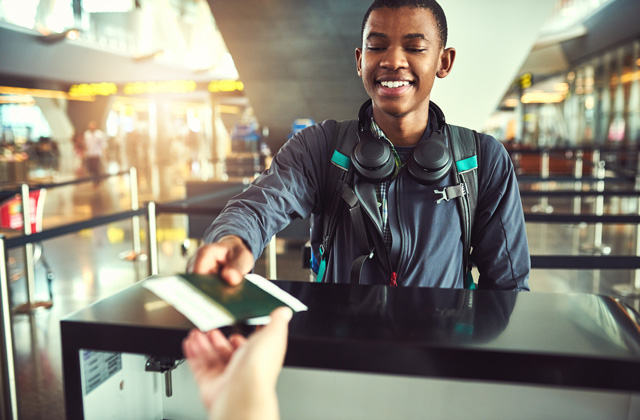5 Airport Security Tips for International Students
Make sure your luggage, devices, social media accounts and documents are in order before you go through airport security.
Arriving soon in the U.S. to study at an American college or university? Check out these five tips for going through airport security to make sure your documents, devices, luggage and social media accounts are in order before you reach your port of entry.
Tip 1: Know the U.S. entry documents you need as an international student on an F-1 visa
As an international student on an F-1 visa, you’ll want to make sure you have all the right documents required for the immigration check at the airport. U.S. Customs and Border Patrol have a list of required documents they could request while they conduct port-of-entry questions during your border control interview. These documents include your:
- academic transcripts
- passport
- I-20
- SEVIS Fee receipt
- admission letter
- financial documents
- contact information for the international student office at your college
- prescriptions for any medicines you take
It’s a good idea to check the U.S. Customs website for an updated list of what you need to bring to get into the U.S. when you arrive. You’ll also learn what you are not allowed to bring, such as certain types of foods (especially fresh fruits and vegetables), plants and some medicines, among other items.
Tip 2: Know the baggage requirements for international travel
If you know what luggage you can carry on the plane, the size of luggage that’s allowed and what you should check, you’ll be a step closer to a smooth arrival. Most importantly, make sure you put the required documents listed above in your carry-on luggage, so that they are not lost or unavailable because of delays. This way, you will be prepared to answer the port-of-entry questions during your arrival interview.
Tip 3: Know the social media screening questions border control will ask
The U.S. government now requires social media checks from each traveler who wants to enter the country. Keep in mind that you are not required to share the passwords to your social accounts, only the identifiers, or profile names, you use or have used in the last five years.
- Flickr
- Google+
- Myspace
- Tumblr
- Vine
- YouTube
- Douban
- Sina Weibo
- Tencent Weibo
- Youku
- VK
- Twoo
- Ask.fm
During your arrival interview, you can expect customs agents to ask you questions about your identity, study plans and social media accounts. If they cannot verify your answers through the documentation you have with you, you may have to go through a secondary inspection, which can take longer and have more in-depth questions. Having all your documents in order and in your carry-on luggage can help you avoid this procedure.
Tip 4: Know your rights and use good judgment
Can customs agents check your mobile devices? In November 2019, a U.S. federal court ruled that the government cannot check an individual international traveler’s devices—including cell phones, tablets and laptops—without reasonable suspicion, as it is a violation of the 4th Amendment of the U.S. Constitution.
However, just because agents can’t legally access your laptop or mobile device, it’s still important to use good judgment when it comes to your behavior online. “Students are still responsible and should be aware that their social media posting is a reflection of their profile and intent while visiting the United States as temporary non-immigrant visa holders,” says Leon Fresco, an attorney with the law firm Holland & Knight. “Discovery of any inflammatory material online could still disqualify them from entry.”
Tip 5: Know TSA rules at airport security and other international travel guidelines
If you are not entering the U.S. at an airport near your university, you may need to transfer to a domestic flight after you pass through the immigration check at border control and customs.
The U.S. Transportation Security Administration (TSA) screens all passengers flying within the U.S. So, before you leave home, check out the list of TSA rules covering every stage of your journey to make sure you are prepared. Here are a few things to remember:
- You will have to remove your shoes during airport screening, so wear comfortable shoes that are easy to slip on and off.
- You are required to follow the 3-1-1 rule when bringing liquids onto an airplane in your carry-on luggage: Liquids must fit in a 3.4-oz. bottle size or smaller, must be placed in a 1-quart size bag and you can only bring one 1-quart bag containing liquids in your carry on. All other liquids must be placed in your checked luggage.
- You will have to remove all electronic devices from your carry-on bags when you go through security, so make sure those items are easily accessible.
Traveling through airport security and passport control can be stressful, even for Americans. If you remember to be patient, stay calm and not take anything personally in this final stage of your journey to the United States, you will be on your way to your exciting adventure studying at your new university.
If you have further questions about the visa procedures and other airport security processes, connect with a U.S. News Global Education advisor.
